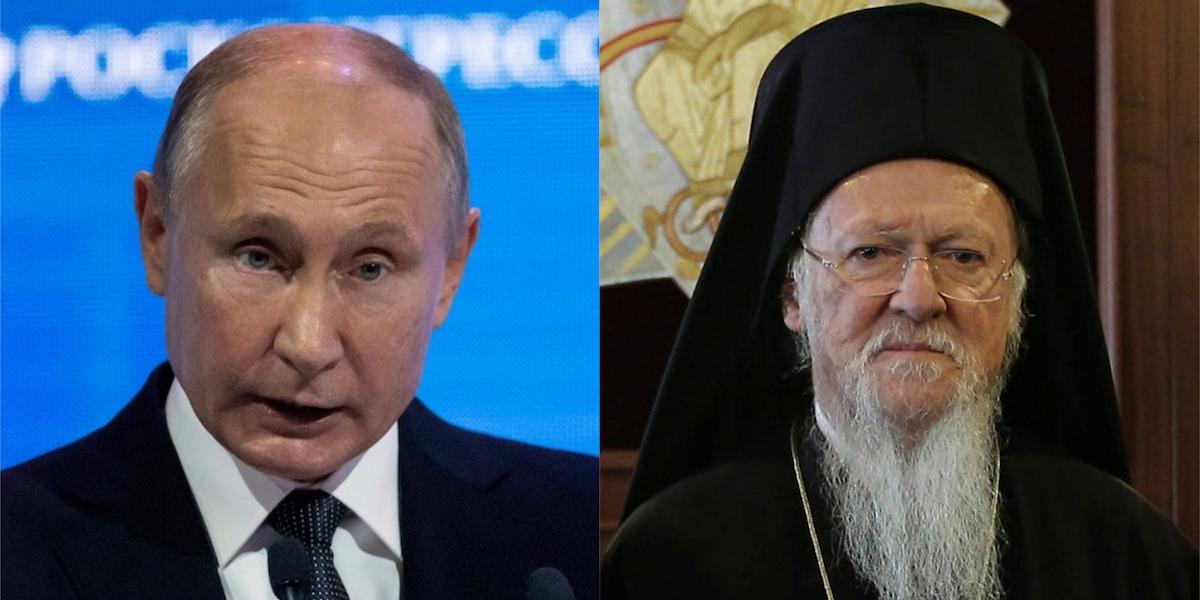- A powerful Orthodox priest activated a 1,567-year-old power to elevate the status of the Ukrainian Orthodox Church and make it on par with its Russian counterpart.
- Previously, Russia had power over the Ukrainian Orthodox Church, and the move damages its international prestige.
- The Russian Orthodox Church severed ties with the Ecumenical Patriarchate of Constantinople as a result.
- Bartholomew’s decision is likely a big blow to Vladimir Putin, who has close ties to the Russian Orthodox Church and has asserted Russia’s religious dominance over Ukraine.
Vladimir Putin faced a major blow to his power when a powerful Orthodox priest used an ancient and obscure power to undermine Russia’s religious influence in Ukraine.
On October 11 the Ecumenical Patriarchate of Constantinople – an Istanbul-based religious body that oversees Orthodoxy Christianity – recognized the independence of the Ukrainian Orthodox Church, which had previously been subservient to Russia.
Ecumenical Patriarch Bartholomew, the head of the church, elevated the statuses of two bishops in Ukrainian churches and gave them power to set up an independent church on the same footing as their Russian counterpart.
In doing so, Bartholomew relied on an authority granted to his office in the early days of Christianity, established at the Council of Chalcedon in 451 AD. The power has hardly ever been used, and took many be surprise.
The Russian Orthodox Church - with whom Putin has warm relations - responded to the slight by cutting ties with the rest of the Orthodox church.
The split has been described as the biggest schism in Orthodox Christianity since the Orthodox church became independent from the Roman Catholic Church in 1054, the BBC reported.

The new religious order effectively undermines Russia's religious power in Ukraine.
Shortly after Bartholomew's decision was announced, Ukrainian President Petro Poroshenko said according to the BBC: "It's an issue of Ukrainian national security. It's an issue of Ukrainian statehood."
Relations between Moscow and Kiev deteriorated after Russia annexed Crimea in March 2014, and were strained further when a Soviet-made missile shot down a Malaysia Airlines flight MH17 over an area in Ukraine that was controlled by pro-Russian rebels.
Moscow has also repeatedly claimed to be spiritually inseparable from Ukraine, a claim undermined by the Orthodox church's decision to make Ukraine independent.
"In people's hearts and minds, Crimea has always been an inseparable part of Russia," Putin said in a speech to the nation in March 2014, when the annexation was ongoing.

Putin hits back
The Russian church on Monday said that it could no longer continue being in "Eucharistic communion" with the Istanbul religious body. This means that Russian Orthodox believers can no longer take communion with people from other branches of the church.
Metropolitan Hilarion, a bishop in the Russian Orthodox Church, said that the recognition of the Ukraine church went "against historical truth," according to the BBC.
The Orthodox Church commands a huge presence and power in Russia. It is the largest religion in the country and boasts tens of millions of followers.

Putin cozy with the Orthodox Church
Its head, Patriarch Kirill - who was reportedly an informant for the the KGB, the Soviet spy agency for which Putin worked, during the Cold War - is closely aligned to Putin and his policies, and in 2012 called Putin's rule a "miracle of God."
Putin also relies on the Russian Orthodox Church to endorse many of his polices, such as his opposition to feminism and same-sex marriage, according to Foreign Policy.
Putin's popularity at home hit a record low this year when he broke a 13-year-old promise not to hike the country's national retirement age, which could mean that many Russians will miss out on a pension altogether.
Russia and its military also suffered a series of embarrassing blunders over the past few weeks as Western investigators claimed that the GRU, the country's military intelligence service, was behind a nerve agent poisoning in England and an attempted hack into the global chemical weapons watchdog in the Netherlands this spring.

